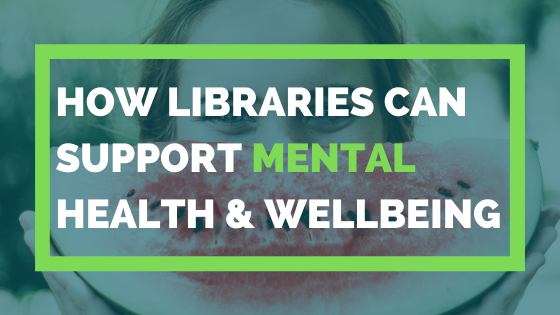On this week’s Princh Library Blog post we have guest writer Barbara Band, independent library consultant, sharing her thoughts on how libraries can support mental health & wellbeing.
The roles of libraries
There are many facets to a library that will vary according to the needs of the community at any given time and it is recognised that libraries have several roles in today’s society:
- To support literacy – both learning to read and improving reading skills
- To support reading for pleasure – via print and online books and magazines
- To support personal study – both formal and informal
- To provide a meeting space and cultural activities for the community
However, one of the important aspects is supporting mental health and wellbeing; something that is often overlooked, particularly as the intrinsic value of this role is quite hard to measure.
Mental health
The World Health Organisation states that mental health is: “a state of well-being in which every individual realises his or her own potential, can cope with the normal stresses of life, can work productively and fruitfully, and is able to make a contribution to his or her community”. Mental health problems are a growing public health concern with mental health and behavioural problems reported to be the primary driver of disability worldwide. Mind, the UK mental health charity, states that 1 in 4 people will experience a mental health problem of some kind each year in England and statistics from Young Minds indicate this is also an area of concern for young people with:
- 1 in 8 children having a diagnosable mental health disorder
- 1 in 6 young people (age 16 – 24 years) having symptoms of a common mental disorder such as depression or anxiety
- Half of all mental health problems manifesting by the age of 14
So, how can libraries support mental health and wellbeing?
The first thing to recognise is that a library provides a unique space, frequently an area of calm within the frantic milieu of society. A public library is often the only non-commercial space in a community, somewhere you can go and spend time without being expected to spend money. A school library is a safe environment with a trusted adult, a location not usually associated with lessons, exams, targets or grades. That’s not to say libraries are quiet places; my town centre library on a Saturday afternoon is bustling with people and activities, and my school libraries at breaktimes were full to bursting. However, in designing the layout I always made sure there was a quiet corner with cosy seating where pupils could sit and read, and the majority of public libraries have chairs tucked away in alcoves.
Library resources, which are authoritative and credible, are an important aspect. As well as print books and leaflets, the library can also highlight e-resources, websites and helplines. Research tells us that between 43% and 61% of English working age adults routinely do not understand health information which has a financial cost to the UK health budget; this makes the role of the librarian in directing people to trustworthy sources even more essential. Books on specific health issues can be borrowed and The Reading Agency has some excellent Reading Well programmes – for adults, young people and children – which have been developed and endorsed by health professionals. These books can be found in public libraries as well as many school libraries, and are often recommended by GPs. Within schools it is important to note that health and wellbeing education is now a compulsory part of the National Curriculum for ages 5 – 16 years and also features in the curriculums of the devolved nations giving the librarian opportunities to work with both teaching and pastoral staff.
A library is more than the sum of its parts and this is demonstrated by the range of activities that occur within them and the popularity of these. Too numerous to mention all of them, they include: baby rhyme times; storytelling; craft sessions; art groups; Lego clubs; chess and board games groups; mindfulness sessions; and more. Both school and public libraries connect with their respective communities in this way, running activities that engender friendship through common interests and helping people to develop a sense of belonging, something that is important for their wellbeing. This approach enables them to take the library outside its four walls into the wider environment and connect with people who would otherwise not use it.
Librarians, especially in schools, often have an overview of the community and so are able to create a holistic approach, identifying needs or filling gaps in extra-curricular provision. School libraries are also the place than many students suffering from poor mental health and wellbeing gravitate towards, perhaps recognising it as a safety net, and thus school librarians are in a perfect position to support these students, to offer them resources that may help them or to highlight possible issues with other staff.
And let’s not forget that very basic of activities; reading. There are valid science-backed reasons for reading and research evidence that shows its value and benefits on literacy levels, particularly amongst children and young people. An improvement in concentration and memory, better vocabulary and writing skills, and increased empathy and general knowledge; what’s not to like? But as well as linking with literacy, reading for pleasure – which includes both fiction and non-fiction (think about how many people enjoy looking at cookery books without taking them anywhere near the kitchen!) – reduces stress, aids sleep and alleviates depression. All pluses when it comes to good mental health and wellbeing.
For our readers in the UK, if you or someone you know is struggling with addiction or mental health issues, you can find helpful resource and get professional help by reaching out to organizations like Rehab 4 Addiction.

Barbara Band
Independent library consultant and trainer
Website: www.barbaraband.com
Blog: http://barbara567band.blogspot.com/
Twitter: @bcb567
Recent posts
Enhancing User Experience For Libraries In The Digital Age
In this week's Princh Library Blog post, recurring guest writer Sam L. Bowman covers how your library can improve the user experience on [...]
Library Password Practices—Balancing Accessibility and Security
In this week's Princh Library Blog, recurring guest writer Nina Grant discusses a basic, but nevertheless crucial digital security principle: secure password [...]






Libraries play an essential yet often underestimated role in supporting mental health. Your blog highlights the quiet heroes providing resources and safe spaces for healing and self-improvement. Great blog!